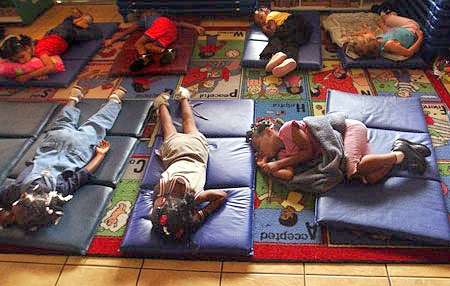Parents forced to put babies in childcare for more than 42 hours a week
 Stuff co.nz 27 November 2016
Stuff co.nz 27 November 2016
Family First Comment: Good for adults but what about for children and babies?
Katie Peters has no option but to put her seven-month-old son in daycare for over 40 hours a week.
She is not alone, with the latest government statistics showing children are staying in daycare for extended periods – sometimes longer than the adult working week.
The figures show 10 per cent of babies aged under 12 months were in childcare for over 42 hours a week.
The proportion of babies and toddlers in childcare for long periods tripled from 2000 to 2015, according to Ministry of Education figures.
Education Minister Hekia Parata said families needed to find their own balance with regard to parental and non-parental care.
“There is no one best way.
“The important consideration is that the ECE service needs to provide quality care and education that complements the care provided by the child’s family.
“ECE for under-twos is regulated to ensure that ratios are appropriate and enable the personalised care that supports young children’s development and learning. We have one of the best adult to child ratios in the world,” Parata added.
There are no regulated limits on the hours a child can spend in ECE. However, the government subsidy is capped at 6 hours per day.
In the year to March 2016, 96.6 per cent of children starting school had participated in ECE.
Virginia Oakly, an executive member of the NZEI teaching union, said if the maternity leave benefit was increased and parents were able to work more flexible hours, this hours spent in care wouldn’t be rising.
“While it’s not ideal, parents don’t always have a choice – they need to make ends meet, especially in Auckland when you have housing problems and then the issue of travelling to work,”
There has been a major debate about the effects of long hours in care on children’s development, says associate professor Helen Hedges, head of pedagogy at Auckland University.
“We now have a growing research evidence base internationally that affirms that children spending time in quality ECE centres has a positive effect on children’s development, supports families in child rearing, and has good long-term academic and social outcomes for children.
“There is little evidence yet that tells us whether or not shorter or longer hours make any difference to this – it is the quality that matters,” Hedges said.
She believed current government policy was focused on increasing participation, rather than quality.
Bob McCoskrie, National Director of Family First NZ, said the long hours were concerning.
“Babies are spending more time in daycare than primary age children are expected to spend at school when they first start,” he said.
“With government spending on early childhood education being more than $1.7 billion per annum, it is essential that the benefits of the investment in ECE are weighed against the real needs of very young children, babies and their families.”
The Brainwave Trust, an independent thinktank, published a review in March this year finding that the new generation of babies placed in childcare face behavioural and health risks.
The review found kids who attended childcare were more likely to display aggression, hyperactivity, disobedience and problems with attachments. Health risks included higher rates of antibiotic use, respiratory illnesses and obesity.
Despite the trust’s independent scientific credentials, the research was embraced by family values lobbyists, and condemned by the childcare industry as “scaremongering”.
READ MORE: http://www.stuff.co.nz/life-style/parenting/baby/caring-for-baby/86884977/parents-forced-to-put-babies-in-childcare-for-more-than-42-hours-a-week







